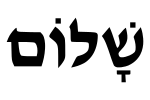
Modern Hebrew
Standard form of the Hebrew language spoken today / From Wikipedia, the free encyclopedia
Dear Wikiwand AI, let's keep it short by simply answering these key questions:
Can you list the top facts and stats about Modern Hebrew?
Summarize this article for a 10 year old
Modern Hebrew (עִבְרִית חֲדָשָׁה ʿĪvrīt ḥadašá [ivˈʁit χadaˈʃa]), also called Israeli Hebrew or simply Hebrew, is the standard form of the Hebrew language spoken today. Developed as part of Hebrew's revival in the late 19th century and early 20th century, it is the official language of the State of Israel, and the world's only Canaanite language in use. Coinciding with the creation of the state of Israel, where it is the national language, Modern Hebrew is the only successful instance of a complete language revival.[7][8]
| Modern Hebrew | |
|---|---|
| "Hebrew" / "Israeli Hebrew" | |
| עברית חדשה | |
 Render of the word "shalom" in Modern Hebrew, including vowel diacritics | |
| Region | Southern Levant |
| Ethnicity | Israeli Jews |
Native speakers | 9 million (2014)[1][2][3] |
Early forms | |
| Hebrew alphabet Hebrew Braille | |
| Signed Hebrew (national form)[4] | |
| Official status | |
Official language in | |
| Regulated by | Academy of the Hebrew Language |
| Language codes | |
| ISO 639-1 | he |
| ISO 639-2 | heb |
| ISO 639-3 | heb |
| Glottolog | hebr1245 |
 | |
Hebrew, a Northwest Semitic language within the Afroasiatic language family, was spoken since antiquity and the vernacular of the Jewish people until the 3rd century BCE, when it was supplanted by Western Aramaic, a dialect of the Aramaic language, the local or dominant languages of the regions Jews migrated to, and later Judeo-Arabic, Judaeo-Spanish, Yiddish, and other Jewish languages. Although Hebrew continued to be used for Jewish liturgy, poetry and literature, and written correspondence,[9] it became extinct as a spoken language.
By the late 19th century, Russian-Jewish linguist Eliezer Ben-Yehuda had begun a popular movement to revive Hebrew as a living language, motivated by his desire to preserve Hebrew literature and a distinct Jewish nationality in the context of Zionism.[10][11][12] Soon after, a large number of Yiddish and Judaeo-Spanish speakers were murdered in the Holocaust[13] or fled to Israel, and many speakers of Judeo-Arabic emigrated to Israel in the Jewish exodus from the Muslim world, where many adapted to Modern Hebrew.
Currently, Hebrew is spoken by approximately 9–10 million people, counting native, fluent, and non-fluent speakers.[14][15] Some 6 million of these speak it as their native language, the overwhelming majority of whom are Jews who were born in Israel or immigrated during infancy. The rest is split: 2 million are immigrants to Israel; 1.5 million are Israeli Arabs, whose first language is usually Arabic; and half a million are expatriate Israelis or diaspora Jews.
Under Israeli law, the organization that officially directs the development of Modern Hebrew is the Academy of the Hebrew Language, headquartered at the Hebrew University of Jerusalem.